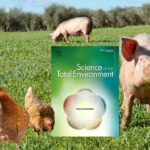
An increasing number of titanium dioxide-free toothpastes
In France, titanium dioxide (TiO2) has been removed from around 50 toothpastes in 2 years. While some brands are lagging behind, most have begun to remove it from their toothpastes, and some have even banned it altogether.
In a context of health alerts, active monitoring by associations is taking place
In May 2023, two publications by INRAE highlighted again the risks of oral exposure to titanium dioxide (TiO2) nanoparticles, showing in particular that TiO2 nanoparticles can pass directly into the bloodstream via the mucous membranes of the mouth, and damage the DNA of exposed human oral cells.
Banned since 2020 in food because of its genotoxic potential, TiO2 is paradoxically still authorized* and used as a colorant in toothpastes (and in medicines).
* Please note: until further notice, TiO2 is authorized for use in toothpastes, but only in “macro” form: nanoparticles of TiO2 are NOT authorized for use as colorants (nano TiO2 is authorized only as a UV filter, under certain conditions).
However, some brands have proactively removed TiO2 from their toothpastes. Between 2019 and 2021, the association Agir pour l’Environnement found that 23 toothpaste references were now TiO2-free. In mid-2023, AVICENN did a survey both online and in small, medium and large stores to check whether this downward trend was continuing. It also contacted the most popular brands directly.
More and more toothpastes without titanium dioxide
Although it is difficult to make a rigorous comparison due to the arrival of new references on the market, our study clearly showed that by 2023, titanium dioxide will be increasingly rare in toothpastes. This is the result of a gradual phase-out initiated by a few brands and chains several years ago, and extended to other brands and toothpaste references more recently.
Casino was one of the forerunners, having committed to removing titanium dioxide from all its products by 2018. One of the market leaders, Signal, confirmed the gradual and general withdrawal of TiO2 from all its references (without substitution)**, starting in 2019. By 2020, Leclerc’s Bio Naïa and Intermarché’s Labell had withdrawn it from all their references (organic and non-organic). By 2021, no Monoprix toothpaste contained TiO2. Fluocaril cosmetic toothpastes were reformulated in 2022**.
Vademecum Laboratories have also withdrawn TiO2 in 2021 (organic and non-organic)**.
In July 2023, AVICENN identified around 50 toothpastes that no longer contained TiO2, although they still did in 2021, bringing to almost 75 the number of references in which TiO2 has been removed since 2019. Not to mention the large number of new toothpastes that have been formulated without TiO2 since their initial launch.
Organic toothpastes no longer contain TiO2
More generally, the entire French organic sector now offers TiO2-free toothpastes.
By 2019, Cosmebio advised its members to remove TiO2 from products other than sunscreens and make-up. La Vie Claire confirmed to us that it has withdrawn TiO2 from its historical ranges since 2021; its new toothpastes produced after this date have never contained it. Biocoop has refused to use titanium dioxide in its cosmetics (excluding make-up and suncare products) since 2022.
And since June 2023, the new version 4 of the COSMOS standard only authorizes TiO2 in sun protection products and decorative cosmetics (make-up, hair dyes), not toothpastes (nor shower gels, soaps, shampoos, etc.). In fact, even if it does not constitute a systematic and exhaustive examination of all the references on the French market (particularly online), our survey did not identify any COSMOS-labeled organic toothpastes with TiO2 in their composition.
Non-organic brands follow suit
In addition to the brands mentioned above, the trend towards the elimination of TiO2 can clearly be observed at Parodontax, and also, albeit more slowly, at other brands which now offer TiO2-free toothpastes, even if these coexist alongside other, often older, references still containing TiO2 (this is the case, for example, of Colgate, Elmex, Email Diamant, Fluocaril, Oral-B, Parogencyl, Sanogyl, etc.). Titanium dioxide is still present in the formulation of some toothpastes. (excluding COSMOS-labeled organic references), but a lot less than before.
In the final analysis, the increasing number of TiO2-free products can be observed almost everywhere… with a few exceptions. Almost all Sensodyne toothpastes, for example, still contain titanium dioxyde, even their children’s toothpaste (6-12 years). For how much longer?
While stocks last
** In July 2023, AVICENN still found TiO2 in toothpastes in stores from brands formally committed to phasing it out – for example Fluocaril, Signal or Vademecum: probably stocks of old toothpastes before they were reformulated…
Code name: CI77891
If you wish to identify titanium dioxide (TiO2) in cosmetics, you should be aware that it can be labeled as something other than “titanium dioxide“. Search for “titanium dioxide” or “CI77891” (the equivalent of code E171, which concerns TiO2 in food – banned since 2020 – or medicines, but not cosmetics). A magnifying glass can sometimes come in handy!
Media coverage
Our survey was reported in the media (Reporterre, Fémina, 60 millions de consommateurs, ConsoGlobe, …), and also by non-profit organizations (Agir pour l’Environnement, Association Santé Environnement France – ASEF, Cosmébio) and by environmental health professionals (Alice Baras, Tania Pacheff).
Other news on the topic
Upcoming Nano Agenda
- Introductory seminar on the principles of Life Cycle Assessment (LCA) and its specificities when applied to nanomaterials (metal nanoparticles, oxides, etc.), from their production to their end-of-life.
- Organizer: NaMasTE research group (Manufactured Nanomaterials, Toxicology, Ecotoxicology and Risks: Towards Controlled Development)
- Speaker: Gaetana (Tania) Quaranta, Senior Lecturer, University of Strasbourg – IPHC
- Website: https://gdr-namaste.cnrs.fr/

- Webconference for analysis laboratories, plant fertilizer manufacturers and distributors, public authorities…
- Moderated by David Krupka, nanotechnologies development manager at AFNOR Normalisation and Emilie Langlois-Bertrand, nantechnologies standardization project manager.
- In partnership with Armand Masion (CEREGE) and Patrice Charpentier (ANSES).
- This exchange will also be an opportunity to explore the creation of a national platform to identify standardization needs.
- Website: https://www.afnor.org/evenements/qualite/nanotechnologies-agriculture-cadre-pratique-responsable

- International conference on metallic nano-objects for experts working in the interdisciplinary field of metallic nanoparticles, with a particular emphasis on nanoparticle synthesis and characterization, plasmonics, optics and photonics, catalysis, biomedicine, electronics, and nanoparticle recycling
- Organizers / Partners: CNRS, Bordeaux University, Bordeaux INP, ICMCB, CRPP, CBMN, ISM
- Website: https://mno2026.sciencesconf.org



